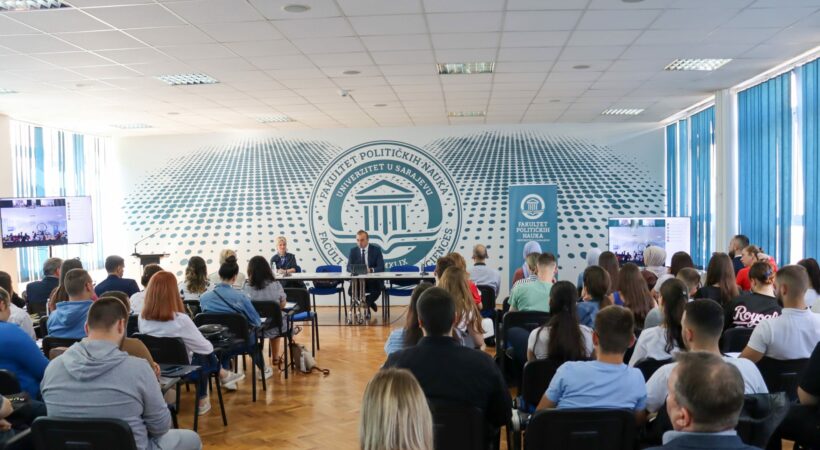In the main hall of the “Vijećnica” or City Hall, one of the emblematic buildings of Sarajevo, strong emotions were felt at 17:24 when a large screen projected the votes of the United Nations General Assembly that had gathered to discuss and vote on the resolution, document A/78/L.67/Rev.1, regarding the Srebrenica genocide recalling all judgments of the International Tribunal for the Former Yugoslavia, in particular eight that contain guilty verdicts for the crime of genocide against Bosnian Muslims committed at Srebrenica in 1995. Hundreds of people flocked to the building to follow together the seventy-eighth session and listen to the interventions and positions of the countries’ delegates that discussed intensely for much of the afternoon before the fateful vote. Starting this year, with 84 votes in favour, 19 against, and 68 abstentions, along with 22 representatives who chose not to vote, the international community designated 11 July as the “International Day of Reflection and Commemoration of the 1995 Srebrenica Genocide”, to be observed annually starting in two months.
The day is already commemorated every year in Bosnia-Herzegovina, particularly at the Srebrenica-Potočari memorial-cemetery complex, where the collective burial ceremony of the identified victims’ remains takes place following a complex process of discovery and recognition throughout the year and allowing the family members to put to rest their dead with dignity.
Today’s vote by the United Nations General Assembly, postponed from its original date at the beginning of May, holds a significant meaning not only for the local population, who face ongoing denial processes, particularly from those associated with Republika Srpska, but also for the international community as a whole. Over the past thirty years, various supranational institutions and individual governments have officially recognised the systematic execution perpetrated by Bosnian Serb troops of over 8,372 civilians in the enclave, which had been designated a safe area by Security Council Resolution 819 (1993), as the first genocide on European soil since the end of the Second World War. Nevertheless, the international recognition at the UN level leaves hopes for the pursuit of justice to thousands of families dispersed worldwide for almost thirty years, many of whom have returned to reside in the area, while others never left. The need for truth and public recognition extends beyond a single date laden with profound implication, which faced fierce opposition from Serbia, Russia, China, and other countries during the voting process and in the declarations leading up to it. The approval of the resolution had been tenaciously opposed in previous years, notably in 2015 on the twentieth anniversary during another attempt within the UN General Assembly.
For all these reasons, the Mayor of Sarajevo, Benjamina Karić, who grew up during the siege of the city in the early nineties, organised the public screening by opening the doors of the institutional seat to all citizens and immediately applauded the passing of the resolution by declaring that its approval marked a “historic day for justice, peace, and truth” worldwide. She symbolically thanked the representatives of the UN member states who voted in favour of the resolution and who officially condemned the genocide. Many of them, in their public speeches, also repeatedly recalled the current situation in Gaza and the lack of effective international action to halt the ongoing genocide.
To date, over 50 people have been convicted by international tribunals, particularly by the International Criminal Tribunal for the Former Yugoslavia, for the Srebrenica genocide, including the war criminals Radovan Karadžić and Ratko Mladić, who have been sentenced to life imprisonment for genocide, war crimes, crimes against humanity during the siege of Sarajevo and other ethnic cleansing campaigns. However, the international law and formal condemnation have not slowed the process of denial nor limited the extensive media coverage in numerous languages that glorify and depict as heroes the figures responsible for the massacres.
In parallel, the work of numerous international and local organisations continues, especially in terms of education, awareness raising, and the defence of human rights. In these two days, the international conference “Social Work and Political Conflict: The Case of Bosnia and Herzegovina” is being held at the Faculty of Political Sciences of the University of Sarajevo (UNSA) with the support of the European Association of Schools of Social Work (EASSW) and features prominent guests from several countries such as Jim Campbell, Buse Erzeybek, Carolyn Ewart, Danielle McIlroy and Ayse Ozada. The conference is structured into various panels over two days, dedicated to in-depth comparative analysis of case studies relating to Bosnia-Herzegovina, Cyprus, and Northern Ireland, with a specific session on genocide and missing persons led by Samira Krehić from the International Commission on Missing Persons and Hasan Nuhanović from the Srebrenica Memorial Center.










